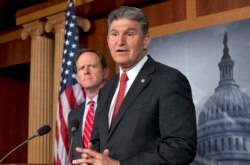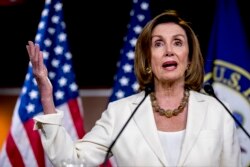Newtown. Charleston. Orlando. Parkland.
And now after mass shootings in El Paso, Texas and Dayton, Ohio, Congress again is confronted with the question of what, if anything, lawmakers should do to combat the scourge of gun violence afflicting the country.
While both parties are calling for action, the retreat to familiar political corners was swift. Democrats demanded quick approval of gun-control legislation — some of it already passed by the House — while Republicans looked elsewhere for answers, focusing on mental health and violent video games.
With Congress away from Washington for a five-week recess, and the parties intractably divided, the odds appear stacked in favor of gridlock. But Democrats and some Republicans said this time can and should be different.
"While no law will end mass shootings entirely, it's time for Congress to act to help keep our communities safer," said Sen. Pat Toomey, R-Pa., as he vowed to again push bipartisan legislation to expand background checks to all commercial firearm sales.
Toomey and his co-sponsor, Sen. Joe Manchin, D-W.Va., each spoke with President Donald Trump about the background checks bill and a separate proposal making it easier to take guns away from people believed to be a danger to themselves or others.
Trump "showed a willingness to work with us" on background checks and other measures, Toomey told reporters in a conference call. "He was very constructive."
Toomey and Manchin have tried to pass a background check bill since 2013, in the aftermath of the Sandy Hook school shooting, and could not even muster a Senate vote last year.
Manchin called mass shootings and other gun violence "tragic American problems," and said it was "past time for Congress to take action."
Other Democrats put the burden on Trump, saying he should demand Senate Majority Leader Mitch McConnell put a House-passed bill strengthening background checks up for a vote.
Senate Democratic Leader Chuck Schumer said the Senate GOP leader is blocking gun safety reforms that more than 90% of Americans support. He and House Speaker Nancy Pelosi said McConnell, R-Ky., should call the Senate into emergency session to take immediate action on the House-passed bill, which would require federal background checks for all firearms sales and transfers, including those sold online or at gun shows. Another bill allows an expanded 10-day review for gun purchases.
The House approved the bills in February but they have not come up for consideration in the Republican-controlled Senate.
On a conference call Monday, Pelosi told Democratic lawmakers they have a "golden opportunity to save lives" by pressuring Trump and McConnell to act, according to a Democratic aide who was granted anonymity to discuss the private session.
"The House stands ready to return to pass legislation, if the Senate sends us back an amended bipartisan bill or if other legislation is ready for House action," Pelosi said later in a letter to colleagues.
"Senate Republicans are prepared to do our part," McConnell said in a statement Monday. He spoke with GOP committee leaders including Judiciary Committee Chairman Lindsey Graham and encouraged them to look for bipartisan solutions "to protect our communities without infringing on Americans' constitutional rights," McConnell said.
In a brief White House speech, Trump condemned the weekend shootings in Texas and Ohio that left 31 people dead as barbaric crimes "against all humanity" and called for bipartisan cooperation to respond to an epidemic of gun violence. He signaled opposition to large-scale gun control efforts, saying, "hatred pulls the trigger, not the gun."
"We vow to act with urgent resolve," Trump said.
Trump offered a slightly different message earlier in the day, tweeting that "Republicans and Democrats must come together and get strong background checks, perhaps marrying this legislation with desperately needed immigration reform. We must have something good, if not GREAT, come out of these two tragic events!"
It was not clear how or why he was connecting the issues.
Trump's omission of background checks in his White House remarks showed he was already backing away from his morning tweet, Democrats said.
"It took less than three hours for the president to back off his call for stronger background check legislation," Pelosi and Schumer said in a joint statement. "When he can't talk about guns when he talks about gun violence, it shows the president remains prisoner to the gun lobby," especially the National Rifle Association.
Congress has proven unable to pass substantial gun violence legislation, despite the frequency of mass shootings, in large part because of resistance from Republicans, particularly in the GOP-controlled Senate.
But in a show of bipartisanship, Graham, R-S.C., and Sen. Richard Blumenthal, D-Conn., announced an agreement to create a federal grant program to help states that adopt "red flag" protection order laws to take guns away from people believed to be a danger to themselves or others. A similar bill did not come up for a vote in the Senate last year.
The grants would enlist mental health professionals to help determine which cases need to be acted on, Graham said, adding that while the program allows for quick action, it requires judicial review.
Trump signaled openness to red-flag laws in his White House speech, saying, "We must make sure that those judged to pose a grave risk to public safety do not have access to firearms and that if they do those firearms can be taken through rapid due process."
In a statement, the NRA offered "deepest sympathies" to the families and victims and said it is "committed to the safe and lawful use of firearms" by gun owners.
"We will not participate in the politicizing of these tragedies but, as always, we will work in good faith to pursue real solutions that protect us all from people who commit these horrific acts," the NRA said.
A spokesman for Rep. Bennie Thompson, D-Miss., chairman of the House Homeland Security Committee, said the panel is planning to hold hearings on domestic terrorism when lawmakers return next month.







